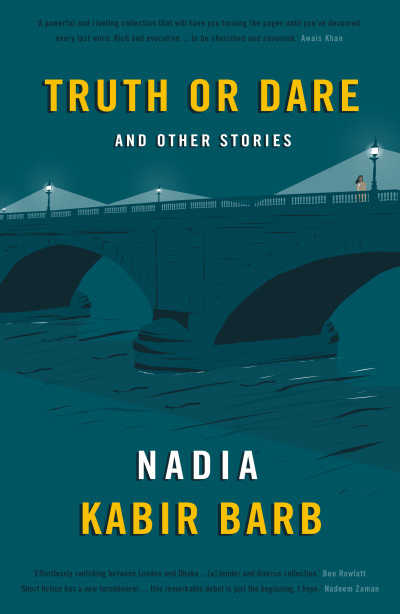Truth or Dare and Other Stories
 Publishing as an industry is obsessed with new – books yet to come out… but what about the brilliant books that have already been published? Each month we spotlight a different author whose book was published more than a year ago, which you might be yet to meet… This month we hear from Nadia Kabir Barb about the brilliant Truth or Dare and Other Stories…
Publishing as an industry is obsessed with new – books yet to come out… but what about the brilliant books that have already been published? Each month we spotlight a different author whose book was published more than a year ago, which you might be yet to meet… This month we hear from Nadia Kabir Barb about the brilliant Truth or Dare and Other Stories…

Shuffling the Shelves: Truth or Dare and Other Stories by Nadia Kabir Barb

A question I am often asked is why I chose to become a writer, especially given my background in economics, the health and development sector and nearly eighteen years in journalism. Why step off a well-established path and embrace a profession that is unpredictable at the best of times and downright brutal at others? What compels me to put pen to paper – or rather, finger to keyboard?
For me, the answer begins with The Alchemist by Paulo Coelho, a book that has profoundly shaped how I see life. It has taught me the importance of following one's personal legend – the unique purpose each of us is meant to fulfil – and to trust that the universe will guide and support us along the way. In the story Santiago, the young shepherd and protagonist, leaves behind his familiar life to follow his dream, discovering along the way that true fulfilment comes from pursuing what resonates deeply within us.
The book also emphasises the need to live in the present moment, paying attention to the little signs the universe provides, and trusting that everything is connected and happens for a reason. As Coelho writes. ‘When you want something, all the universe conspires in helping you to achieve it.’
Sadly, the universe did not grant me the two extra inches of height I once wished for, but it did bring me something far more meaningful: my collection of short stories, Truth or Dare, and the joy of finding a literary home with Renard Press.
Clichéd though it may sound, I had always wanted to be a writer – but being a South Asian Muslim girl growing up in the UK, I rarely saw anyone like me represented in mainstream English literature. So when it came to choosing my under- and postgraduate degrees, I opted for economics instead of English literature, perhaps out of practicality, perhaps out of a belief that the writing world was not one in which I could belong.
Fast forward a few decades and a brush with death (as writers, we are allowed to be dramatic), and faced with my own mortality, my inner voice kept whispering, ‘If not now, when?’ Life is fragile and time fleeting. So I allowed myself to follow my heart (we are also allowed to be cheesy).
I began writing short stories – not necessarily with the intention of being published, but because I needed to write. I needed to give all the characters that were crammed in my head the voice they deserved. It was an organic process with no purpose other than to create. Unintentionally, the stories kept returning to themes of, loss, longing, resilience and identity. What I realised is that I was also giving myself a voice, and suddenly I felt seen as someone both Bangladeshi and British.
Sometimes, the universe conspires quietly. Sometimes it nudges, sometimes it tests, and sometimes it waits patiently for you to catch up to where you are meant to be.
And of course, there is another answer to why I write – a simple one. I am both an optimist and a masochist, as I suspect most writers are. If, in the end, what I write manages to touch even one reader, make them think, make them laugh or simply feel less alone, then all the uncertainty and self-doubt will have been more than worth it.
The Connoisseur
An extract from one of the Publisher's favourite stories…
The man in the ill-fitting brown suit at the adjacent table was talking in a voice meant to carry. ‘Disgraceful!’ he said, while trying to gauge the extent of his audience. Shamim looked up from his food, as did others at his own table.
‘This biriyani is disgraceful. Where are the potatoes? Is there a shortage of potatoes in Bangladesh? And I tell you,’ he said, pausing for dramatic effect, ‘this,’ and he pointed to the platter in the centre, ‘wasn’t made with ghee.’
A harassed-looking young man hovering nearby came running. ‘No, no, uncle, I assure you we used ghee. Let me get you more potatoes.’ His eyes darted to the guests seated around the other tables to see if they were listening. He was obviously a member of the bride’s family, given his deferential demeanour.
‘More potatoes? Ha!’ His eyes were round with exaggerated incredulity. ‘There wasn’t even one!’
The uncle, who Shamim inferred was a guest from the groom’s side, looked to his companions for affirmation. Some bobbed their heads in agreement; others looked away in embarrassment or gave their attention to the much-maligned biriyani.
The young man clicked his fingers to a bearer holding a jug of water in one hand and a few precariously balanced empty plates in the other. ‘Hey, you, go and get a dish of hot biriyani. Make sure it has lots of potatoes. Go. What are you waiting for?’
The bearer nodded and scurried off in the general direction of the kitchens.
Shamim witnessed the scene unfolding and shook his head as he took a mouthful of said biriyani. He hoped his vociferous neighbour would pipe down before any more attention was directed towards him. He was used to being party to some form of drama at weddings – not all the weddings he had been to, but enough of them to make him relatively untroubled by it. If it wasn’t the food – not enough potatoes in this case – it was the bride fainting during the ceremony due to the heat, the groom’s party arriving late, hostilities ensuing because the bridal party was not adequately obsequious. It added a little spice to the festivities, but this loudmouth was too close for comfort. The sooner Shamim could eat and go the better. He chased the last few grains of the polao around the plate before scooping them up in his spoon. He would have used his fingers – it was inherently more satisfying than using metal utensils – but given everyone else was using forks and spoons he resisted the temptation.
The man next to him, sporting an impressive handlebar moustache underlining a bulbous nose, leant in. ‘Can I pass you something? More biriyani? Some salad?’
‘No, no, thank you, bhai. I’m full. Leaving space for the mishti,’ Shamim said, patting his stomach and wondering what had engendered this sudden show of consideration. They had barely exchanged more than the obligatory greeting since they had taken their places at the table. The attention was unwelcome. His eyes followed the man’s gaze as he glanced over his shoulder to the table with the disgruntled guest. Shamim assumed the man thought he was part of the groom’s entourage. To his relief, and that of his companion, the man in the brown suit was tucking into a plate of biriyani with gusto, temporarily appeased by the pile of potatoes heaped on his plate.
Shamim was sitting with a group of the bride’s relatives. He gleaned this information from their few attempts at conversation, asking each other about some mutual relation or their respective health. They were quite the motley assortment. Opposite him was a middle-aged couple, who said nothing but ate enough food to put Shamim’s appetite to shame. There was the moustachioed man and his wife, who disconcerted him somewhat by smiling benignly at him throughout the evening. There were two young women, the daughters of the middle-aged couple, who giggled more than they ate. Both were wearing brightly coloured, matching saris, one emerald green embellished with gold, the other a vibrant turquoise and gold, with a dazzling glut of sequins. Shamim’s two-year stint working at a sari shop, amongst other jobs, gave him the ability to identify both the type, quality and price of a sari. He pegged them as good-quality, mid-range georgette. Every now and then the duo would whisper something to one another and peek at him under their long lashes, and he couldn’t help gazing at them in admiration. He did, however, make sure that their parents were giving the food their undivided attention when he smiled back at them, not wishing to incur their disapproval. Next to the middle-aged man was someone who looked familiar. The slicked-back hair, the black-rimmed glasses. He couldn’t quite place him. It would come to him when he wasn’t trying so hard to think about it…
– Nadia Kabir Barb, November 2025



Truth or Dare
And Other Stories
£9.99
BUY NOW
‘Right now, someone else’s life was in his hands. He couldn’t say whether it was a few seconds or minutes that they both stood staring at each other, but he had never been so scared in his life.’
In Truth or Dare we follow, spell-bound, as chance encounters bring violent pasts roaring into the present; we wait on tenterhooks as a woman sits by her husband’s hospital bed as both their lives hang in the balance; we watch anxiously as a homeless man begs a woman with her life and career stretching ahead of her not to jump to her death.
By turns comedic, heart-wrenching and moving, these stories paint powerful pictures of pain, love and empathy, and celebrate the power we have over one another. From the rain-soaked waterways of London to the bustling streets of Dhaka, Truth or Dare is a stunning collection that spans two continents and sees the best and worst in both.
Finalist for the 2024 Eyelands Book Award













